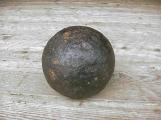9
Many of the young men hid in the hills, while the older people and Indians fought the English. Twenty men were lost on both sides and buried on the mountain or the lowlands. Fourteen English soldiers were buried on the marsh in Hopewell. Most of the buildings in the settlement were burnt by the English. Legend has it that the church bell was rung to alert the Acadians working on the marsh that the English were coming. Another story tells that the church bell was buried with all of the Acadians' valuable possessions inside of it.Major Frye next led an attack on the Hillsborough area settlement. He faced so much resistance from Charles Des Champs de Boishebert and his group of men, supplemented by men who had fled the raid in Shepody, that the first attack was not successful. Twenty-one soldiers were killed, and the English were forced to retreat to their ship. A second attempt forced the Acadians to flee from their homes, the English then burned the homes and crops in the area. In March of 1758, Major Frye led another attack on the Acadians of Shepody who had rebuilt their homes and planted crops again after the first attack in 1755.
Settlers were needed to farm the land after the Expulsion, so the land was first offered to the English soldiers. During this time Joseph Brossard, whom the Acadians called Beausoleil, son of one of the settlers from Pierre Thibodeau's settlement, began to engage in privateering or pirating, of British vessels in the Bay of Fundy. He also began to rally the remaining Acadians, who were still in the area after the expulsion, to attack the British. The Acadians caused so much trouble that the soldiers did not want the land. Eventually, Brossard and his men were captured and either forced into exile or forced to swear an oath not to attack British interests in the area. Most of the Acadians left the area, but some did remain and were still here when the next wave of new settlers arrived. Next a Proclamation for New Englanders to settle here was issued by Governor Lawrence. This would lead to the arrival of the German settlers.
